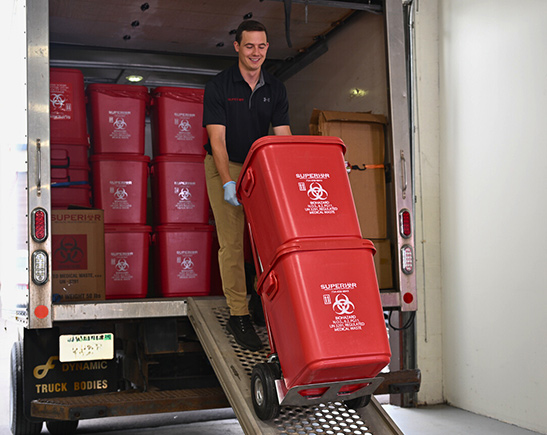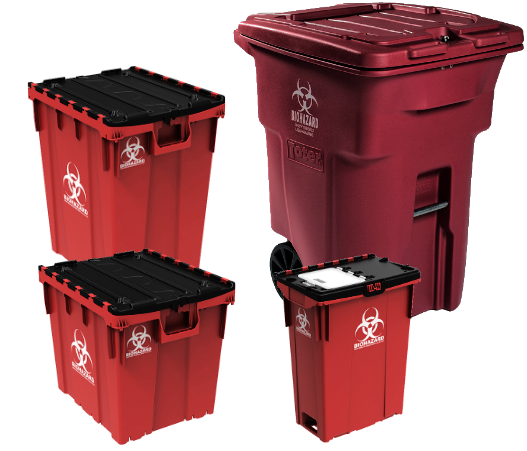Keep Ahead of Regulations: Expert Recommendations on Medical Garbage Disposal
In a globe where the healthcare industry is frequently progressing, it is necessary for medical facilities to remain ahead of laws when it comes to the appropriate disposal of medical waste. From understanding the various classifications of clinical waste to executing the right collection and partition methods, this conversation will certainly provide beneficial insights and actionable pointers to aid facilities remain ahead of laws in the ever-changing landscape of clinical waste disposal.
Understanding Clinical Waste Categories
Understanding clinical waste classifications is important for correct disposal and administration in healthcare centers. Medical waste refers to any kind of waste produced by medical care activities that might position a hazard to public health and wellness or the setting. It is important to classify medical waste properly to ensure its safe handling, treatment, disposal, and transport.
There are a number of classifications of clinical waste that health care centers require to be aware of. The most typical categories include contagious waste, pathological waste, sharps waste, pharmaceutical waste, and chemical waste. Each category has particular standards and laws for its proper management and disposal.
Pathological waste refers to human cells, organs, or body parts that require special handling and disposal. Drug waste consists of run out, extra, or infected medicines that require cautious handling and disposal.
Staying Up-To-Date With Regulatory Changes
Staying current with regulatory adjustments is essential for healthcare facilities to ensure compliance and proper management of clinical garbage disposal. medical waste removal near me. With laws constantly evolving, it is important for medical care centers to stay current to stay clear of charges, fines, and possible harm to the environment and public wellness
To stay ahead of regulative modifications, healthcare centers ought to develop a system for tracking and tracking updates. This can be done by registering for regulative newsletters, participating in seminars and workshops, and proactively joining sector associations. Additionally, centers should mark a team member or team liable for staying educated and disseminating details to appropriate stakeholders.
Routine communication with regulatory firms is also crucial. Healthcare centers should develop relationships with regional, state, and government companies to guarantee they understand any kind of changes in laws that may affect their waste management methods. This can be done via regular meetings, involvement in public remark periods, and positive involvement with regulatory companies.
Furthermore, medical care facilities need to take into consideration partnering with waste administration firms that focus on medical garbage disposal (medical waste disposal services with WasteX). These companies are commonly fluent in the most recent guidelines and can provide assistance and assistance to make certain compliance
Carrying Out Proper Collection and Segregation Methods
To efficiently handle clinical garbage disposal, health care centers have to develop proper collection and segregation methods based on regulatory guidelines. Implementing these methods ensures the safe handling and disposal of possibly unsafe products, shields the setting, and decreases the threat of infections and injuries to medical care employees and the public.
Appropriate collection and segregation methods involve the usage of marked containers and classifying systems. Health care facilities ought to provide clearly classified containers for various kinds of YOURURL.com medical waste, such as sharps, infectious waste, pharmaceutical waste, and non-hazardous waste. These containers should be color-coded and plainly significant to prevent confusion and promote very easy identification.
Additionally, healthcare centers must train their team on the proper treatments for collecting and setting apart clinical waste. This includes educating them on the various sorts of waste, the appropriate containers to make use of, and the relevance of complying with guidelines and laws. Routine training sessions and refresher training courses must be conducted to make certain that personnel stay up-to-date on finest practices.
Moreover, healthcare centers ought to develop a system for regular collection and disposal of clinical waste. This may entail partnering with certified waste monitoring companies that concentrate on medical garbage disposal. These companies will certainly make sure that the collected waste is moved and taken care of in compliance with governing requirements.
Selecting the Right Disposal Methods

Incineration is just one of one of the most effective and common methods for taking care of particular sorts of medical waste, such as pathological waste and sharps. It involves the regulated burning of waste at heats, lowering it to ash. However, incineration can release harmful pollutants into the air and contribute to air contamination.

Chemical therapy involves the use of chemicals to disinfect and reduce the effects of the waste. Microwave therapy makes use of microwave energy to heat and disinfect the waste.
Making Sure Conformity Via Documentation and Training
After thoroughly considering the ideal disposal approaches for clinical waste, medical care centers have to ensure conformity with regulations and minimize ecological influence by applying reliable documents and training treatments. This step is important in preserving a safe and sustainable setting for both health care workers and the public.

Healthcare workers who deal with medical waste ought to get proper training on waste partition, managing, and disposal treatments. By giving click to read more thorough training, medical care centers can encourage their team to make enlightened choices and decrease the threat of inappropriate waste disposal.
Verdict
In verdict, remaining in advance of laws in clinical garbage disposal is vital for medical care facilities. medical waste removal services. Comprehending the different categories of clinical waste, remaining upgraded with governing modifications, carrying out proper collection and partition approaches, picking the suitable disposal techniques, and ensuring conformity with paperwork and training are all important actions. By complying with these guidelines, healthcare organizations can properly get rid of and manage of clinical waste in a responsible and risk-free manner
From recognizing the different categories of clinical waste to implementing Continued the appropriate collection and segregation approaches, this discussion will certainly offer workable suggestions and beneficial insights to aid facilities remain in advance of policies in the ever-changing landscape of clinical waste disposal. - medical waste disposal services with WasteX
The most typical groups consist of infectious waste, pathological waste, sharps waste, pharmaceutical waste, and chemical waste. Healthcare facilities must supply plainly classified containers for various kinds of clinical waste, such as sharps, infectious waste, pharmaceutical waste, and non-hazardous waste. Healthcare facilities ought to establish a detailed system to videotape and track all aspects of medical waste disposal, including types of waste produced, amounts, and disposal methods used. Medical care workers who deal with medical waste ought to get suitable training on waste segregation, dealing with, and disposal procedures.